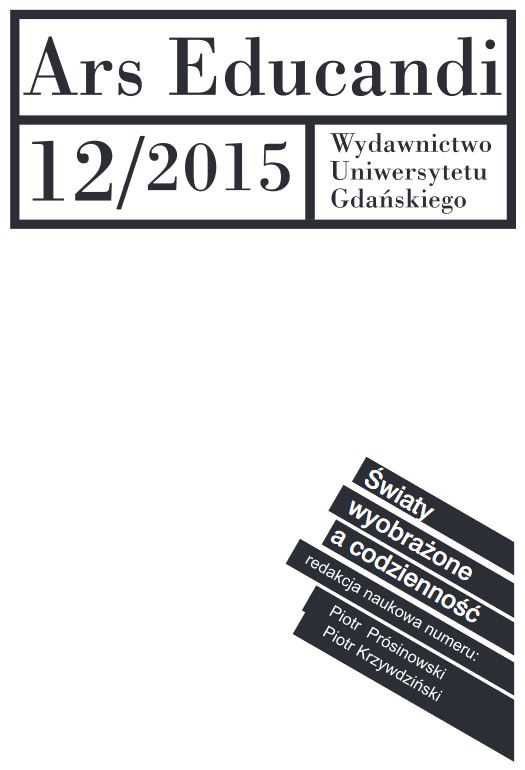Perspektywa światów wyobrażonych w relacji fan–idol muzyczny. Wybrane konteksty współczesnych wartości popkultury
DOI:
https://doi.org/10.26881/ae.2015.12.09Słowa kluczowe:
celebryta, środowiska fanowskie, osoby znacząceAbstrakt
Człowiek z uwagi na sam fakt urodzenia staje się artystą sztuki życia. Jest postawiony przed odpowiedzialnym zadaniem – stworzenia życia według własnego projektu. Jak zauważa Bauman, czasy płynnej nowoczesności wymuszają podejmowanie elastycznych i stanowczych wyborów, którym towarzyszy jeden cel – szczęście. W epoce uzależnienia od mediów celebryci i idole funkcjonują jako wzorce. Stają się znaczącymi „innymi”, zwykle pozytywnie postrzeganymi przez swoich fanów. Zgodnie z kantowską myślą szczęście to dzieło nie rozumu, lecz wyobraźni, więc fani chętnie podtrzymują sztuczne stosunki społeczne w wykreowanym świecie wyobrażonym, którego stają się częścią w nieświadomy sposób. W swoich rozważaniach spróbuję przyjrzeć się kompensowaniu świata niemocy w grupach fandomu muzyki popularnej.

Modernizacja działania Czasopisma oraz tłumaczenia na język angielski artykułów Ars Educandi na lata 2012-2017 zostały sfinansowane ze środków Ministerstwa Nauki i Szkolnictwa Wyższego z zadania Działalności Upowszechniającej Naukę (DUN).
Zadanie: Wdrożenie modułu redakcyjnego na platformie Uniwersyteckich Czasopism Naukowych - systemu wspomagającego redagowanie i zarządzanie czasopismem naukowym Ars Educandi sfinansowano w ramach umowy 661/P-DUN/2018 z dnia 12.06.2018 ze środków Ministra Nauki i Szkolnictwa Wyższego przeznaczonych na działalność upowszechniającą naukę.
Zadanie: Stworzenie nowoczesnej wersji on-line czasopisma Ars Educandi przez wdrożenie modułu publikacyjnego na platformie Uniwersyteckich Czasopism Naukowych oraz obsługę międzynarodowych baz indeksacyjnych sfinansowano w ramach umowy 661/P-DUN/2018 z dnia 12.06.2018 ze środków Ministra Nauki i Szkolnictwa Wyższego przeznaczonych na działalność upowszechniającą naukę.
Zadanie: Przygotowanie anglojęzycznej wersji ostatnich 6 roczników (2012-2017) czasopisma naukowego Ars Educandi i ich wydanie w wersji online sfinansowano w ramach umowy 661/P-DUN/2018 z dnia 12.06.2018 ze środków Ministra Nauki i Szkolnictwa Wyższego przeznaczonych na działalność upowszechniającą naukę.
Downloads
Bibliografia
Bandelow B., 2014, Gwiazdy. O trudnym szczęściu bycia sławnym, tłum. M. Wojdak-Piątkowska, Gdańsk: GWP.
Barker C., 2005, Studia kulturowe. Teoria i praktyka, tłum. A. Sadza, Kraków: Wydawnictwo Uniwersytetu Jagiellońskiego.
Bauman Z., 2000, Globalizacja i co z tego dla ludzi wynika, tłum. E. Klekot, Warszawa: PIW.
Bauman Z., 2002, Społeczeństwo w stanie oblężenia, tłum. J. Margański, Warszawa: Sic.
Bauman Z., 2009, Sztuka życia, tłum. T, Kunz, Kraków: Wydawnictwo Literackie.
Caughey J.L., 1978, Artificial Social Relations in Modern America, „American Quarrerly” Vol. 30, No. 1.
Coupland D., 1997, Życie po Bogu, tłum. J. Rybicki, Warszawa: Prószyński i S-ka.
Coupland D., 1999, Pokolenie X. Opowieści na czasy przyspieszającej kultury, tłum. J. Rybicki, Warszawa: Prószyński i S-ka.
Eagleton T., 2012, Po co nam kultura?, tłum. A. Górny, Warszawa: Muza.
Gloer R., Skrzydlewski W., 2002, Ilustrowany leksykon muzyki popularnej, Poznań: Wydawnictwo Kurpisz.
Godzic W., 2013, Kuba i inni. Twarze i maski popkultury, Warszawa: Sedno.
Goffman E., 2008, Człowiek w teatrze życia codziennego, tłum. H. Datner-Śpiewak, P. Śpiewak, Warszawa: Aletheia.
Jenson J., 1992, Fandom as Pathology: The Consequences of Characterization [w:] Adoring Audience Fan Culture and Popular Media, ed. L.A. Lewis, Londyn–New York: Routledge.
Karczmarzyk M.A., 2013, Dziecko w wirtualnej galerii, Warszawa: Żak.
Kłoskowska A., 2011, Kultura masowa: krytyka i obrona, Warszawa: PWN.
Kobus A., 2013, Fan-fiction a funkcjonowanie literatury popularnej. Zarys perspektywy historycznej, „Kultura Popularna” nr 3.
Lawendowski R., Kaleńska-Rodzaj J. (red.), 2014, Psychologia muzyki. Współczesne konteksty zastosowań, Gdańsk: Harmonia Universalis.
Melosik Z., 2007, Kultura popularna jako czynnik socjalizacji [w:] Pedagogika. Podręcznik akademicki, t. 2, red. B. Śliwerski, Z. Kwieciński, Warszawa: PWN.
Stępień A.B., 1989, Wstęp do filozofii, Lublin: Towarzystwo Naukowe Katolickiego Uniwersytetu Lubelskiego.
Szewczuk W. (red.), 1985, Słownik psychologiczny, Warszawa: Wiedza Powszechna.

 Uniwersyteckie Czasopisma Naukowe
Uniwersyteckie Czasopisma Naukowe




